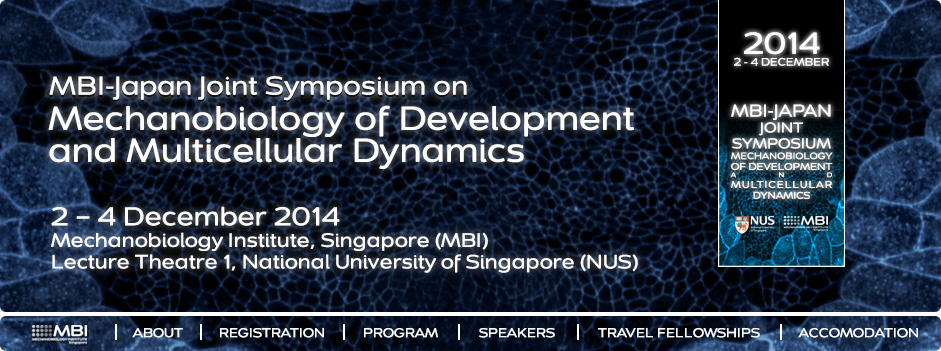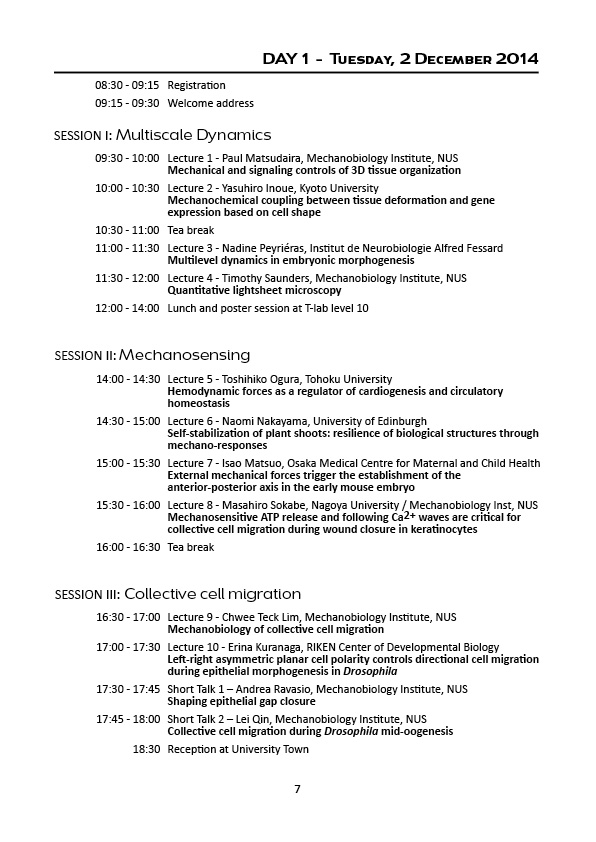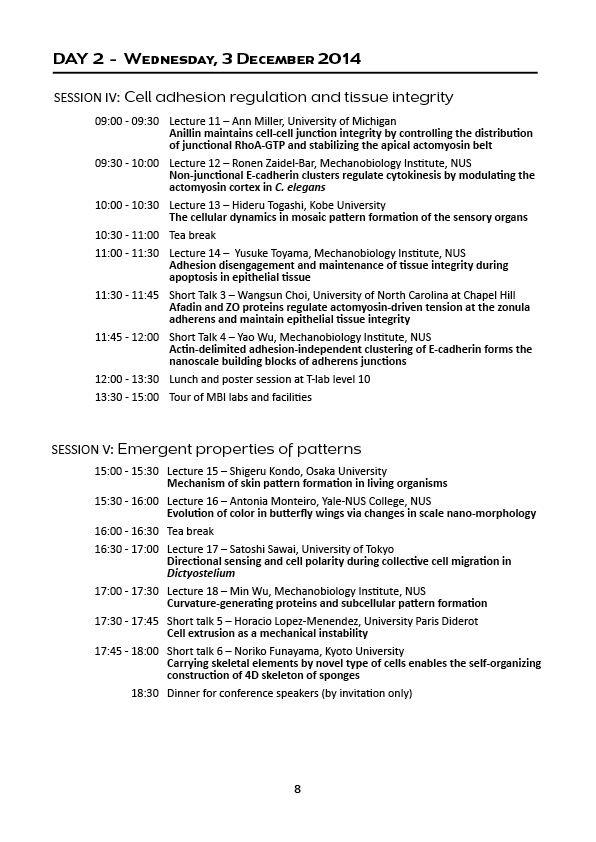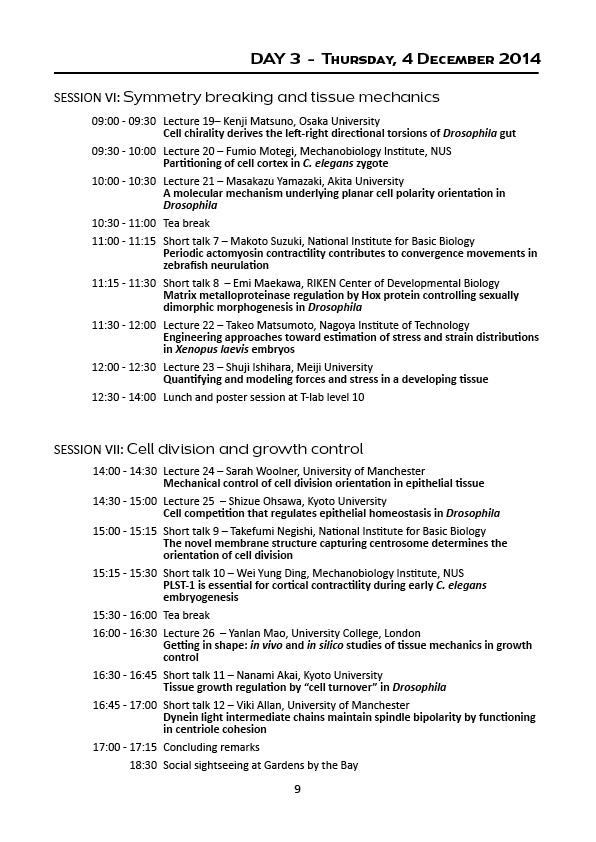
Download the 2014 MBI-Japan Joint Symposium poster (7.4MB PDF, A4 size).
About the symposium
During the development of multicellular organisms, cells undergo cell proliferation, shape change, and migration, which are the basis of tissue morphogenesis.
Elucidating the forces that form and reshape multicellular structures and elicit a myriad of physiological responses is essential for understanding development.
However, only recently the molecular and cellular mechanisms that control the physical properties of cells and tissues, and their environments have begun to be investigated. This symposium aims to bring together experts from different fields to pursue an integral and mechanical view of development.
Topics
- Morphogenesis / Collective cell behavior
- Mechanosensing / Mechanoresponses
- Tissue mechanics
- Cell polarity / Cell division / Cell fate decision
- Patterning
Conference Date
2 – 4 December 2014
Venue
Mechanobiology Institute, Singapore (MBI), Lecture Theatre 1,
National University of Singapore (NUS)
Accommodation
Park Avenue Rochester
31 Rochester Drive, Singapore 138637
Organizing Committee
Naoto Ueno (NIBB, Japan)
Hiroyuki Takeda (U. Tokyo, Japan)
Masahiro Sokabe (Nagoya U., Japan / MBI)
Fumio Motegi (MBI)
Timothy Saunders (MBI)
Yusuke Toyama (MBI)
Ronen Zaidel-bar (MBI)
Programme
The 2014 MBI-Japan Joint Symposium on The Mechanobiology of Development and Multicellular Dynamics aims to bring together experts from different fields to pursue an integral and mechanical view of development.
The symposium will feature 27 invited talks and 12 short talks selected from the abstracts, given by scientists from Japan, Singapore and 4 additional countries. In addition, we will have over 20 poster presentations, presented mainly by young scientists.
Download the complete programme and abstracts book (PDF).
Session chairs
- Session I : Multi-scale dynamics – Yusuke Toyama
- Session II : Mechanosensing – Naoto Ueno
- Session III : Collective cell migration- Yusuke Toyama
- Session IV : Cell adhesion regulation and tissue integrity – Fumio Motegi
- Session V : Emergent properties of pattern – Tim Saunders
- Session VI : Symmetry breaking and tissue mechanics – Masahiro Sokabe
- Session VII : Cell division and growth control – Ronen Zaidel-Bar
Speakers
Speakers from Japan
Yasuhiro Inoue | Kyoto University
Shuji Ishihara | Meiji University
Shigeru Kondo | Osaka University
Erina Kuranaga | RIKEN Center of Developmental Biology
Takeo Matsumoto | Nagoya Institute of Technology
Kenji Matsuno | Osaka University
Isao Matsuo | Osaka Medical Center for Maternal and Child Health
Toshihiko Ogura | Tohoku University
Shizue Ohsawa | Kyoto University
Satoshi Sawai | The University of Tokyo
Hideru Togashi | Kobe University
Masakazu Yamazaki | Akita University
Speakers from Singapore
Chwee Teck Lim | Mechanobiology Institute, Singapore, NUS
Paul Matsudaira | Mechanobiology Institute, Singapore, DBS, NUS
Antonia Monteiro | Yale NUS College, National University of Singapore
Fumio Motegi | Mechanobiology Institute, Singapore, NUS
Timothy Saunders | Mechanobiology Institute, Singapore, NUS
Masahiro Sokabe | Nagoya University / MBI, NUS
Yusuke Toyama | Mechanobiology Institute, Singapore, NUS
Min Wu | Mechanobiology Institute, Singapore, NUS
Ronen Zaidel-Bar | Mechanobiology Institute, Singapore, NUS
International Speakers
Yanlan Mao | University College, London
Ann Miller | University of Michigan
Naomi Nakayama | University of Edinburgh
Maithreyi Narasimha | Tata Institute of Fundamental Research
Nadine Peyriéras | Institut de Neurobiologie Alfred Fessard
Sarah Woolner | The University of Manchester
Registration
Registration is now closed.
Travel Fellowships
The deadline for submission of travel fellowship applications has passed.
We are pleased to provide a limited number of travel fellowships to support travel to Singapore for the conference. Eligibility is limited to graduate students who are working toward their PhDs and postdoctoral fellows only. Deadline for submission: 24 October 2014.
To Apply
Download and complete the Travel Fellowship Application Form (DOC)
Please note your poster title and abstract should be limited to 200 words (excluding names, addresses and email addresses. Please do not include figures.
Submit the application form along with your Curriculum vitae (in WORD [.doc] format) to the conference secretary at mbi-japan-conference@nus.edu.sg.
IMPORTANT
Your Travel Fellowship application also serves as your registration. There is no need to complete online registration if you submit your application form via email to the conference secretary. Recipients of travel fellowships will be notified via email by the end October.
Sponsors
This symposium is supported by the Mechanobiology Institute, Singapore (MBI), and Grant-in-Aid for Scientific Research on Innovative Areas, Ministry of Education, Culture, Sport, Science and Technology, Japan. From molecules and cells to organs: trans-hierarchical logic for higher-order pattern and structures.
Additional support provided by Nikon.
Contact: mbi-japan-conference@nus.edu.sg
About the Mechanobiology Institute, Singapore

About The Japan Society for the Promotion of Science (JSPS) Grants-in-Aid for Scientific Research program

Grants-in-Aid are awarded to promote creative and pioneering research across a wide spectrum of scientific fields, ranging from the humanities and social sciences to the natural sciences. Grants are awarded to projects organized by individual researchers or research groups at Japanese universities or research institutes engaged in basic research, particularly research in critical fields attuned to advanced research trends. Learn more →


